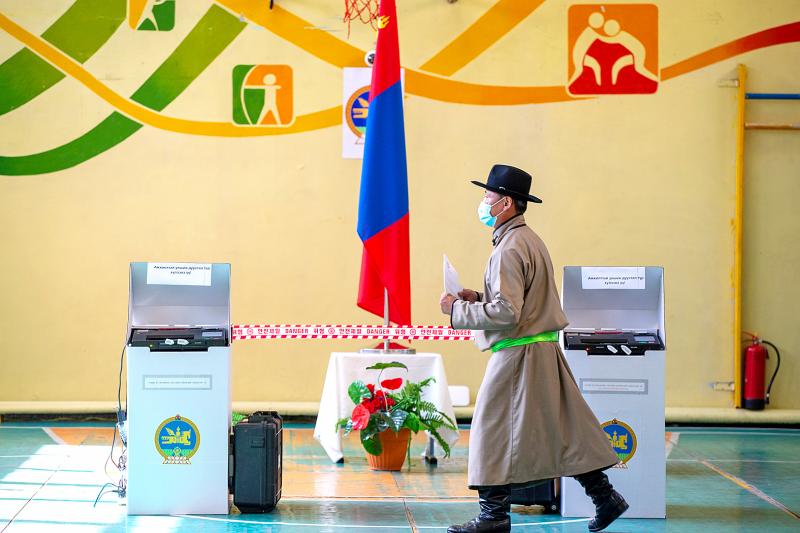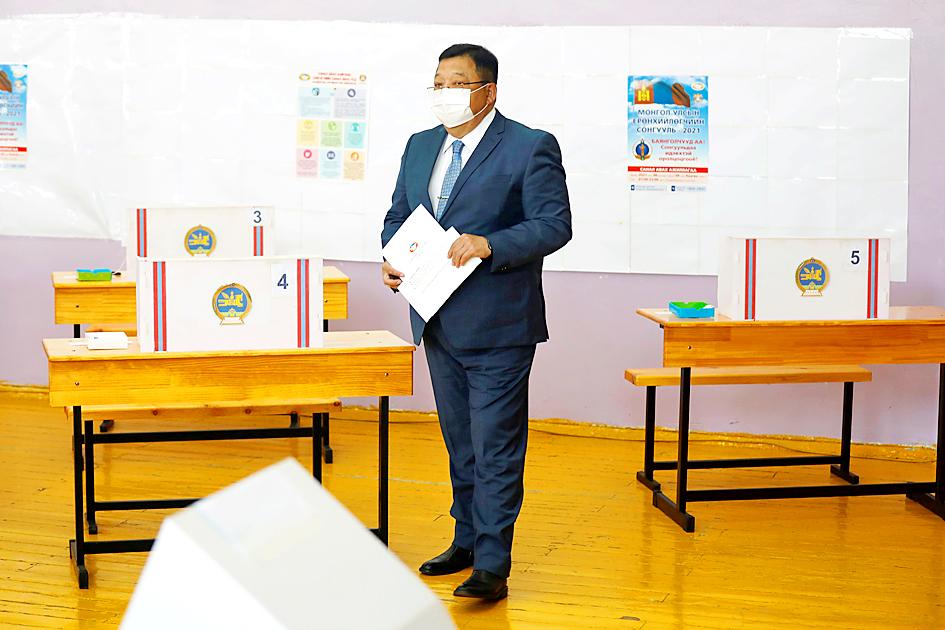Mongolians yesterday began voting for a new president amid COVID-19 restrictions and efforts to revive the economy of the vast landlocked nation of just 3 million people.
The winner would be Mongolia’s sixth president since the peaceful transition from communism to democracy in 1992. Incumbent Battulga Khaltmaa of the Democratic Party is barred by the constitution from seeking a second six-year term.
Among the candidates, former prime minister Ukhnaagiin Khurelsukh of the Mongolian People’s Party (MPP), which exercises a strong majority in parliament, has raised concerns about a possible strengthening of the military’s involvement in public affairs due to his background with the armed forces.

Photo: EPA-EFE
The MPP also controls the Cabinet and Khurelsukh’s biggest rival, Sodnomzunduin Erdene, of the much-weakened Democratic Party, has warned that the MPP winning the presidency would threaten Mongolia with dictatorship.
Former tech CEO Dangaasurengiin Enkhbat of the smaller National Labor Party is running as a third-party candidate.
The presidency is a largely ceremonial position, although it does include powers over the military and the right to veto legislation in some cases. Power is mainly vested in the parliament, the Cabinet and the office of the prime minister.

Photo: Reuters
A total of 2,151,329 voters are registered, the General Election Commission said.
Polls close at 10pm and it was not clear when a winner would be announced.
Voters are required to observe social distancing and restrictions on public gatherings have severely curtailed campaign events, prompting candidates to shift much of their outreach to voters online.
Mongolia’s already ailing economy has been thrown into crisis due to the pandemic, with 69,022 cases and 324 deaths reported and the number of new local infections hitting a daily record last week.
That has forced the temporary closure of markets and other enterprises in the capital, Ulan Bator, to which many in the traditionally herding population have moved in recent years.
Corruption and pandemic-related disruptions in demand for Mongolia’s chief exports, such as coal and copper, are also dragging on the economy.

STEPPING UP: Diminished US polar science presence mean opportunities for the UK and other countries, although China or Russia might also fill that gap, a researcher said The UK’s flagship polar research vessel is to head to Antarctica next week to help advance dozens of climate change-linked science projects, as Western nations spearhead studies there while the US withdraws. The RRS Sir David Attenborough, a state-of-the-art ship named after the renowned British naturalist, would aid research on everything from “hunting underwater tsunamis” to tracking glacier melt and whale populations. Operated by the British Antarctic Survey (BAS), the country’s polar research institute, the 15,000-tonne icebreaker — boasting a helipad, and various laboratories and gadgetry — is pivotal to the UK’s efforts to assess climate change’s impact there. “The saying goes

Floods on Sunday trapped people in vehicles and homes in Spain as torrential rain drenched the northeastern Catalonia region, a day after downpours unleashed travel chaos on the Mediterranean island of Ibiza. Local media shared videos of roaring torrents of brown water tearing through streets and submerging vehicles. National weather agency AEMET decreed the highest red alert in the province of Tarragona, warning of 180mm of rain in 12 hours in the Ebro River delta. Catalan fire service spokesman Oriol Corbella told reporters people had been caught by surprise, with people trapped “inside vehicles, in buildings, on ground floors.” Santa Barbara Mayor Josep Lluis

Police in China detained dozens of pastors of one of its largest underground churches over the weekend, a church spokesperson and relatives said, in the biggest crackdown on Christians since 2018. The detentions, which come amid renewed China-US tensions after Beijing dramatically expanded rare earth export controls last week, drew condemnation from US Secretary of State Marco Rubio, who on Sunday called for the immediate release of the pastors. Pastor Jin Mingri (金明日), founder of Zion Church, an unofficial “house church” not sanctioned by the Chinese government, was detained at his home in the southern city of Beihai on Friday evening, said

TICKING CLOCK: A path to a budget agreement was still possible, the president’s office said, as a debate on reversing an increase of the pension age carries on French President Emmanuel Macron yesterday was racing to find a new prime minister within a two-day deadline after the resignation of outgoing French Prime Minister Sebastien Lecornu tipped the country deeper into political crisis. The presidency late on Wednesday said that Macron would name a new prime minister within 48 hours, indicating that the appointment would come by this evening at the latest. Lecornu told French television in an interview that he expected a new prime minister to be named — rather than early legislative elections or Macron’s resignation — to resolve the crisis. The developments were the latest twists in three tumultuous